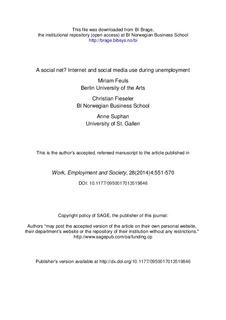| dc.contributor.author | Feuls, Miriam | |
| dc.contributor.author | Fieseler, Christian | |
| dc.contributor.author | Suphan, Anne | |
| dc.date.accessioned | 2015-01-09T14:36:01Z | |
| dc.date.accessioned | 2015-03-10T11:22:58Z | |
| dc.date.available | 2015-01-09T14:36:01Z | |
| dc.date.available | 2015-03-10T11:22:58Z | |
| dc.date.issued | 2014 | |
| dc.identifier.citation | Work, Employment and Society, 28(2014)4: 551-570 | nb_NO |
| dc.identifier.issn | 1469-8722 | |
| dc.identifier.issn | 0950-0170 | |
| dc.identifier.uri | http://hdl.handle.net/11250/278790 | |
| dc.description | This is the author’s accepted, refereed manuscript to the article | nb_NO |
| dc.description.abstract | Many people who are unemployed tend to experience forms of psychological and social losses, including a weakened time structure, diminished social contacts, an absence of collective purpose, falling status, and inactivity.
This article focuses on the experience of diminished social contacts and addresses whether social media help the unemployed maintain their relationships. Based on
qualitative interviews with unemployed individuals, the article identifies various types of social support networks and their impact on individual experiences of inclusion and exclusion. Although the unemployed use social media to cultivate their social support networks, the opportunity to establish new contacts, both private and professional, is underutilized. Thus, social network differentiation between the unemployed and employed persists online in social media. | nb_NO |
| dc.language.iso | eng | nb_NO |
| dc.publisher | Sage | nb_NO |
| dc.title | A social net? Internet and social media use during unemployment | nb_NO |
| dc.type | Journal article | nb_NO |
| dc.type | Peer reviewed | nb_NO |
| dc.date.updated | 2015-01-09T14:36:01Z | |
| dc.source.journal | Work, Employment and Society | nb_NO |
| dc.identifier.doi | 10.1177/0950017013519846 | |
| dc.identifier.cristin | 1138580 | |
| dc.description.localcode | 2, Forfatterversjon | nb_NO |
